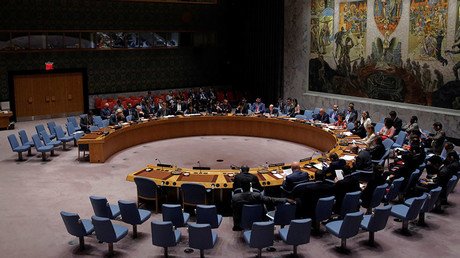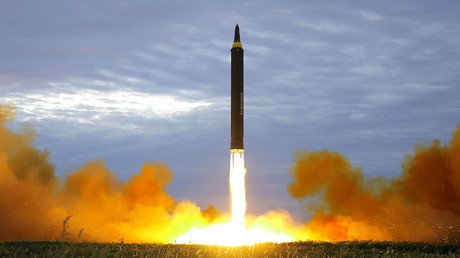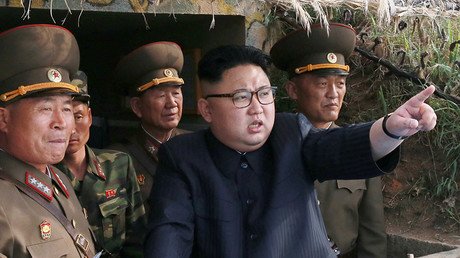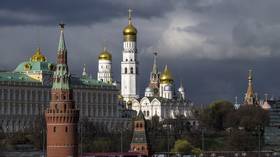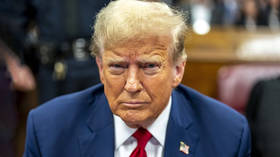US threatens to ‘cut China off’ from dollar if it does not uphold sanctions against N. Korea
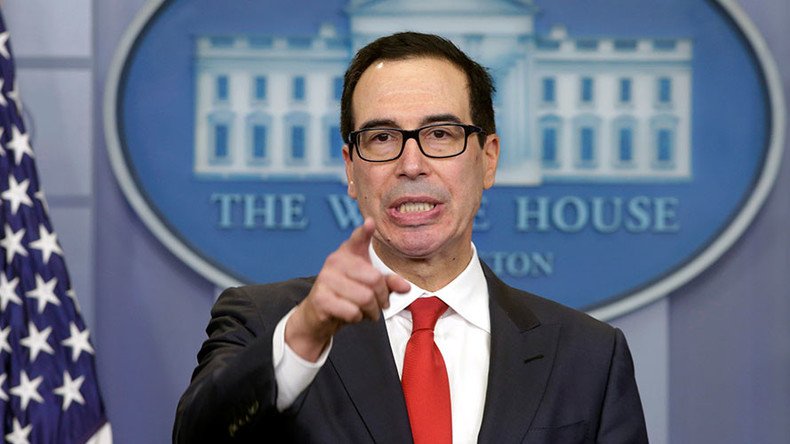
The US could impose economic sanctions on China if it does not implement the new sanctions regime against North Korea, the US Treasury Secretary has warned. Steven Mnuchin said the restrictions could involve cutting off Beijing’s access to the US financial system.
“North Korea economic warfare works,” Mnuchin said Tuesday at the Delivering Alpha Conference in New York City. “We sent a message that anybody who wanted to trade with North Korea – we would consider them not trading with us.”
The Treasury Secretary echoed the words of the US envoy to the UN, Nikki Haley, by calling the fresh round of sanctions against Pyongyang “historic.” Mnuchin added “if China doesn’t follow these sanctions, we will put additional sanctions on them and prevent them from accessing the US and international dollar system.”
Washington has, so far, been reluctant to impose economic sanctions on China over concerns of possible retaliatory measures from Beijing and the potentially catastrophic consequences for the global economy.
Washington runs a $350 billion annual trade deficit with Beijing. China also holds $1 trillion in US debt, which amounts to 28 percent of US Treasury bills, notes and bonds held by a foreign government.
US lawmakers, however, seemed to be more inclined to exert pressure on Beijing and other countries striking deals with Pyongyang as they demand a “supercharged” response to North Korea’s nuclear tests, including imposing sanctions on companies from China and any other country doing business in North Korea.
“I believe the response from the United States and our allies should be supercharged,” said Ed Royce, chairman of the House of Representatives Foreign Affairs Committee during a hearing Tuesday.
“We need to use every ounce of leverage... to put maximum pressure on this rogue regime,” he said, adding that “time is running out.” Royce also called on Washington to target major Chinese banks, including the Agricultural Bank of China and the China Merchants Bank for dealing with Pyongyang.
He also said China was apparently reluctant to follow through on the sanctions adopted by the UN Security Council (UNSC) against the North. “It’s been a long, long time of waiting for China to comply with the sanctions that we pass and, frankly, with the sanctions that the United Nations passed,” he said.
The committee chair went on to say the US could give Chinese banks and companies “a choice between doing business with North Korea or the United States.” He added that the US should also “go after banks and companies in other countries that do business with North Korea the same way.”
Committee members also expressed unease over the fact that the sanctions imposed on North Korea have so far been ineffective in preventing Pyongyang from developing its nuclear and missile programs.
“We’ve been played by the Kims for years,” Republican Representative Ted Poe said, referring to North Korean leader Kim Jong-un and his predecessors, as reported by Reuters.
President Donald Trump also downplayed the role of the newly adopted sanctions later Tuesday. ”We think it’s just another very small step, not a big deal. I don’t know if it has any impact,” he told reporters at the start of a meeting with Malaysian Prime Minister Najib Razak.
Trump also said he already discussed the issue with his State Secretary of State Rex Tillerson. He ominously added that “those sanctions are nothing compared to what ultimately will have to happen” without specifying what he meant by that.
The UNSC unanimously approved a new resolution on sanctions against Pyongyang on September 11. Following a series of behind-the-scenes negotiations Sunday, diplomats agreed not to ban oil exports into North Korea. Instead, the ninth set of restrictive sanctions against Pyongyang authorized an annual cap of 2 million barrels of refined petroleum products to North Korea.
It also banned the North’s textile exports – the second-biggest export for the country, which totals $752 million – according to data from the Korea Trade-Investment Promotion Agency. Chinese and Russian negotiators managed to persuade the US delegation not to impose a travel ban or asset freeze on North Korea’s leader Kim Jong-un.
On Tuesday, the North Korean ambassador to Moscow said sanctions will not make his country change its policies. Pyongyang’s nuclear program helps it to deter the “hostile policy of the US,” Kim Yong-jae added.
